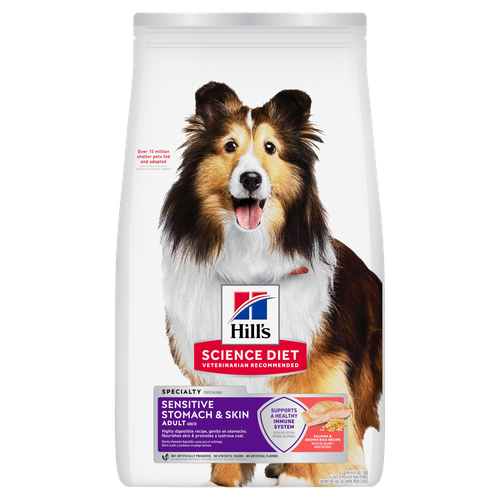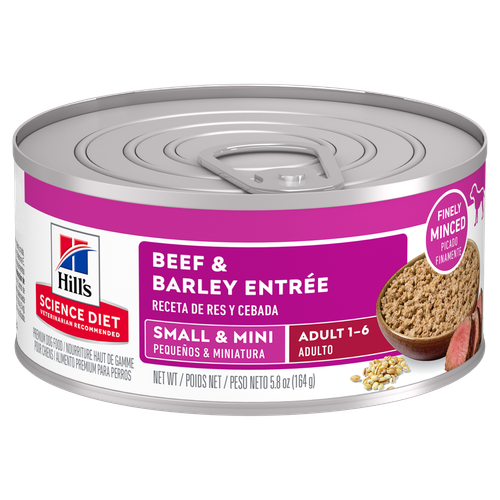
-
Find the right food for your petTake this quiz to see which food may be the best for your furry friend.Find the right food for your petTake this quiz to see which food may be the best for your furry friend.Featured products
 Adult Stomach & Skin Salmon & Brown Rice Recipe Dog Food
Adult Stomach & Skin Salmon & Brown Rice Recipe Dog FoodScience-backed nutrition tailored for skin and digestive health, packed with clinically proven, immune system supporting antioxidants.
Shop Now Adult Sensitive Stomach & Skin Chicken & Barley Recipe Dog Food
Adult Sensitive Stomach & Skin Chicken & Barley Recipe Dog FoodScience-backed nutrition tailored for skin and digestive health, packed with clinically proven, immune system supporting antioxidants.
Shop Now Chicken & Barley Entrée, Beef & Barley Entrée
Chicken & Barley Entrée, Beef & Barley EntréeChicken & Barley recipe and Beef & Barley recipe with precisely balanced nutrition to keep adult dogs active and healthy.
Shop NowFeatured products Senior Vitality Adult 7+ Tuna & Vegetables Stew
Senior Vitality Adult 7+ Tuna & Vegetables StewImproves Everyday Ability to Get Up & Go
Shop Now Adult 7+ Indoor Chicken Recipe Cat Food
Adult 7+ Indoor Chicken Recipe Cat FoodSupports energy level and beautiful fur in mature indoor cats
Shop Now Adult Turkey & Liver Entrée Cat Food
Adult Turkey & Liver Entrée Cat FoodPrecisely balanced nutrition with the delicious taste of minced turkey & liver to help fuel the energy needs of cats during the prime of their life
Shop Now -
Dog
- Dog Tips & Articles
-
Health Category
- Weight
- Food & Environmental Sensitivities
- Urinary
- Digestive
- Joint
- Kidney
-
Life Stage
- Puppy Nutrition
- Adult Nutrition
- Senior Nutrition
Cat- Cat Tips & Articles
-
Health Category
- Weight
- Skin & Food Sensitivities
- Urinary
- Digestive
- Kidney
-
Life Stage
- Kitten Nutrition
- Adult Nutrition
Featured articles The Science Behind Our Love for Pets
The Science Behind Our Love for PetsLearn the scientific reasons why we have such strong connections with our pets, and what science says about the love between humans and our furry friends.
Read More What Is Littermate Syndrome? Pet Adoption Guide
What Is Littermate Syndrome? Pet Adoption GuideLearn more about littermate syndrome in dogs and cats and how to successfully navigate adoption and early socialization processes.
Read More How to Properly Mix Wet & Dry Pet Foods
How to Properly Mix Wet & Dry Pet FoodsAn Orange cat eating from a bowl filled with mixed food
Read More -


As a cat parent, you know your feline friend will stake claim to the best sun patch in the house and stay there for a long time — they love to hang out in the heat. But what temperature do cats like the most? And do you have to pay higher heating bills to accommodate your pet?
What Temperature Do Cats Prefer?
First, keep in mind that a cat's normal body temperature is between 99 and 102.5 degrees Fahrenheit or 37.2 and 39.2 degrees Celsius, compared to the average human body temperature.
Most people tend to be comfortable at room temperature, which is about 68 F or 20 C (not too hot, not too cold), but what temperature do cats like for their comfort? Much higher, around 86 F and 100 F or 30 C and 38 C, as cited by The Scientific World Journal.
What Temperature Do Cats Like at Home?
Cats love warm and cozy spaces, but you don't have to keep your thermostat set to sauna-level just for them. They can't ask you to turn up the heat (although they would if they could), and it's not exactly comfortable (or healthy) for you to turn your home into a steam room. However, you can establish an ambient temperature in your living space that works for you and your feline family members.

The Scientific World Journal article points out that because a cat's "thermoregulatory environment" (the temperature the surrounding area needs to be to maintain ideal body temperature) is typically lower than they prefer, it's important to set up hot spots around your house, such as warm bedding and, yes, boxes.
Cats are obsessed with hanging out in cardboard boxes for many reasons: shelter, security, comfort and warmth. You can also create seating and sleeping areas near windows and glass doors with a cushion, rug or blanket, but most cats will plop down on the floor to catch a catnap in a sunbeam.


Tasty Tips
What Temperature Is Too Hot for Cats?
Any temperature over 100 F or 38 C is too hot for cats. Despite their fondness for all things warm, it's possible for cats to become overheated. To cool off, they may seek out cool places like a bathtub or sink, and some cats may stick their faces in front of an air conditioning vent to catch the cold breeze.
Cats don't often suffer from heatstroke, but it can happen. If your cat shows signs of being overheated, including sweating, take steps to cool them off, including offering them plenty of cool, fresh water. If your cat's body temperature is higher than 104 F, it can be a sign of heatstroke or illness, so contact your veterinarian right away.
What About Seasonal Changes?
Depending on which part of the world you and your cat inhabit, seasonal changes may cause drastic temperature fluctuations.
In the northern hemisphere, for example, where temperatures regularly drop below freezing during certain months, you'll have to do more to keep your cat warm, explains the Cornell Feline Health Center. This way, when sweater-weather hits, they'll be nice and cozy. In areas where temperatures can soar, such as in Australia, the mantra is "keep your cat cool." Toss a few ice cubes in their water and provide lots of shady spots, recommends Vetwest Animal Hospitals.
What temperature do cats prefer? Cats thrive in consistent, comfortably warm environments with the option to cool off when necessary. You can help your cat by setting up "different temperature zones" in your home, says the American Veterinary Medical Association, so your cat can warm up or chill out, depending on their mood.


Christine O'Brien is a writer, mom, and long-time cat parent whose two Russian Blues rule the house. Her work also appears in Care.com, What to Expect, and Fit Pregnancy, where she writes about pets, pregnancy, and family life. Find and follow her on Instagram and Twitter @brovelliobrien.
Related products

Improves Everyday Ability to Get Up & Go

Precisely balanced nutrition with the delicious taste of minced turkey & liver to help fuel the energy needs of cats during the prime of their life

Delectable chunks with tender chicken smothered in a rich gravy

Supports energy level and beautiful fur in mature indoor cats
Related articles

Discover which cat toys games your feline friend might like, and how they are great sources of exercise. Explore our library of articles to learn more.

When you adopt a cat, you don't just gain a best friend; you also save her life. Here's why getting a cat from a local animal shelter makes so much sense.

Discover how to train your cat, starting with very basic first steps that both reward good behavior and discourage the bad.

Learn how to litter train a kitten with this guide to potty training, including when to start litter training kittens and troubleshooting tips.

Put your cat on a diet without them knowing
Our low calorie formula helps you control your cat's weight. It's packed with high-quality protein for building lean muscles, and made with purposeful ingredients for a flavorful, nutritious meal. Clinically proven antioxidants, Vitamin C+E, help promote a healthy immune system.
Put your cat on a diet without them knowing
Our low calorie formula helps you control your cat's weight. It's packed with high-quality protein for building lean muscles, and made with purposeful ingredients for a flavorful, nutritious meal. Clinically proven antioxidants, Vitamin C+E, help promote a healthy immune system.

